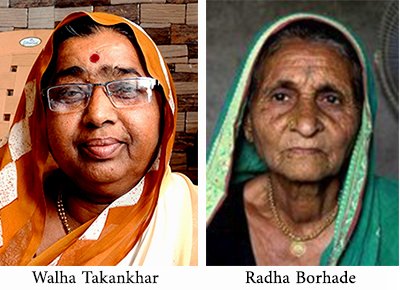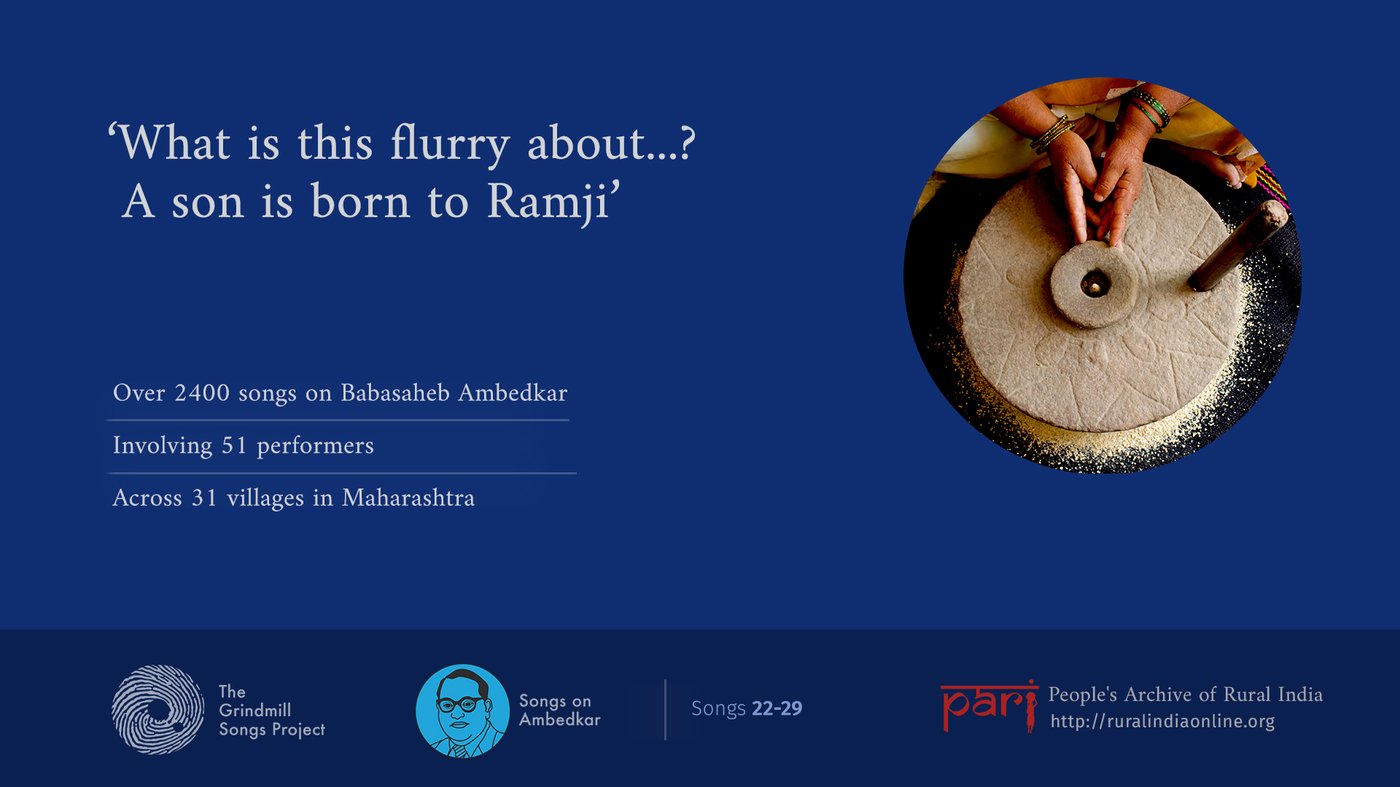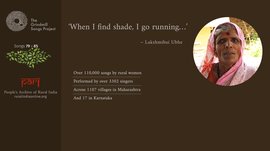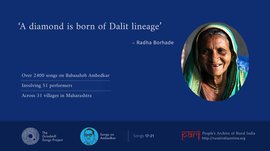In eight songs, three singers from Majalgaon in Beed district hail the birth of Bhimrao in Mhow, Madhya Pradesh. They express gratitude to him, and speak of the new identity that Buddhism has given them. To mark the birth anniversary of Babasaheb Ambedkar on April 14, PARI’s Grindmill Songs Project features couplets on Dr. Ambedkar and caste issues throughout this month
Rangubai Potbhare, Walhabai Takankhar and Radhabai Borhade sing eight ovi in this edition of the Grindmill Songs. The singers are or were residents of Bhim Nagar, a Dalit hamlet in Majalgaon, a taluka village in Beed district.
The work of Babasaheb Ambedkar and his role as a beacon for Dalits and all other oppressed communities inspires the women to sing ovi in praise of their leader. For the Grindmill Songs Project, Majalgaon has been a wellspring of ovi about Dr. Ambedkar, the revered national leader and statesman, voice of the oppressed, and architect of India’s Constitution.
In the first of the eight ovi here, Rangubai sings about flurry and excitement in Mhow, a bustle about the birth of a baby. (Mhow is a cantonment town in Madhya Pradesh; since 2003 it is officially also called Dr. Ambedkar Nagar. Babasaheb was born here on April 14, 1891). The ovi tells us that the news spreads in town that a son is born to Ramji (Ambedkar).

In the second ovi , Radhabai Borhade sings that the naming ceremony of the boy will soon follow. Ramji’s sister Mirabai says that the son should be named Bhimraj. (Traditionally, in Maharashtra, the father’s sister is given the privilege of selecting a newborn’s name).
In the third couplet, the singer asks other women to remember Babasaheb Ambedkar in the mornings – to utter Bhim’s name on waking and only then to step on the earth to start the day’s work at dawn. In the fourth ovi , Radhabai sings that on waking up, she enunciates ‘Bhim, Bhim’ and only then can she think of the coming day’s work.
Walhabai Takankhar and Radhabai Borhade together sing the next four songs. Three couplets are about sprinkling the front yard in the morning with milk. The house, they sing, is Gautam Buddha’s mansion. These ovi say that one of the singers is Gautam’s daughter, the other is his niece.
The eighth ovi returns to the birth of Dr. Ambedkar; the women sing that Bhim is his mother’s (Bhimabai’s) son, and they celebrate this liberation.
Note:
Many Dalit communities are Neo Buddhist; the reference to the Buddha signifies a new identity that rejects the caste system. The singers not only revere Buddha, but also see themselves as a part of his family.
Ovi
5-7 imply that their yard and house should no longer be known as the house of an ‘untouchable’ but as Gautam Buddha’s mansion. In villages, front yards are usually sprinkled with water in the mornings. Sprinkling the yard with milk signifies cleansing, it’s a symbolic erasure of the oppression and ‘impurity’ of caste-driven discrimination against Dalits.
बाई महू गावामधी, कशाचा गलबला
कशाचा गलबला, रामजीला ग पुत्र झाला
या ग शेजारीणी बाई, नामकरन आज
बोलती मीराबाई, नाव ठिवा ग भिमराज
बाई सकळा उठूनी, भीमाच नाव घेवा
धरणीमातावरी, मंग पावुल ग टाकवा
बाई सकळा उठूनी, मुखी माझ्या भीम भीम
मुखी माझ्या भीम भीम, मंग सुधगरत काम
बाई सकळा उठूनी सडा टाकीते दुधाचा
सडा टाकीते दुधाचा वाडा गौतमबुध्दाचा
बाई सकळा उठूनी सडा टाकीते सहील
सडा टाकीते सहील आहे गौतमाची बहीण
बाई सकळा ऊठूनी, सडा टाकीते मी कसी
सडा टाकीते मी कसी आहे गौतमाची ग भाशी
बाई भीम भीम करता, भीम आपल्या माईचा
भीम आपल्या माईचा, झाला उध्दार ग देहीचा
bāī mahū gavāmadhī kaśācā galabalā
kaśācā galabalā rāmajīlā ga putra jhālā
yā ga śējārīṇī bāī kāma karanā kāja
bōlatī mīrābāī nāva ṭhivā ga bhimarāja
bāī sakaḷā uṭhūnī bhīmāca nāva ghēvā
dharaṇīmātāvarī maṅga pāvula ga ṭākavā
bāī sakaḷā uṭhūnī mukhī mājhyā bhīma bhīma
mukhī mājhyā bhīma bhīma maṅga sudhagarata kāma
bāī sakaḷā uṭhūnī saḍā ṭākītē dudhācā
saḍā ṭākītē dudhācā vāḍā gautamabudhdācā
bāī sakaḷā uṭhūnī saḍā ṭākītē sahīla
āhē gautamācī bahīṇa
bāī sakaḷā ūṭhūnī saḍā ṭākītē mī kasī
āhē gautamācī ga bhāśī
bāī bhīma bhīma karatā bhīma āpalyā māīcā
bhīma āpalyā māīcā jhālā udhdāra ga dēhīcā
In Mhow village, what is this flurry?
What is this bustle about? A son is born to Ramji
Come all you women neighbours, today is the naming ceremony
Mirabai says, ‘Name him Bhimraj’
O woman, take Bhim’s name on waking in the morning
Only then place your foot on mother earth
O woman, on waking up in the morning, I utter ‘Bhim, Bhim’
Bhim, Bhim I say, and only then I think of starting my work
O woman, I wake up in the morning, sprinkle the courtyard with milk
I sprinkle with milk in this mansion of Gautam Buddha
O woman, I wake up in the morning, sprinkle the courtyard lightly
I sprinkle (the courtyard) lightly, I am Gautam’s sister
O woman, I wake up in the morning, and see how I sprinkle
How I sprinkle (the courtyard), I am Gautam’s niece
O woman, you say “Bhim! Bhim!” Bhim is his mother’s son
Bhim is his mother’s son, life has been liberated
Performers/Singers
: Rangu Potbhare, Walha Takankhar, Radha Borhade

Village: Majalgaon
Hamlet:
Bhim Nagar
Taluka: Majalgaon
District:
Beed
Caste: Nav Bauddha (Neo Buddhist)
Date: Recorded on April 2, 1996. We re-visited Majalgaon on April 2, 2017 and met the singers.
Photos:
Véronique Bacci and Samyukta Shastri
Poster: Shreya Katyayini




